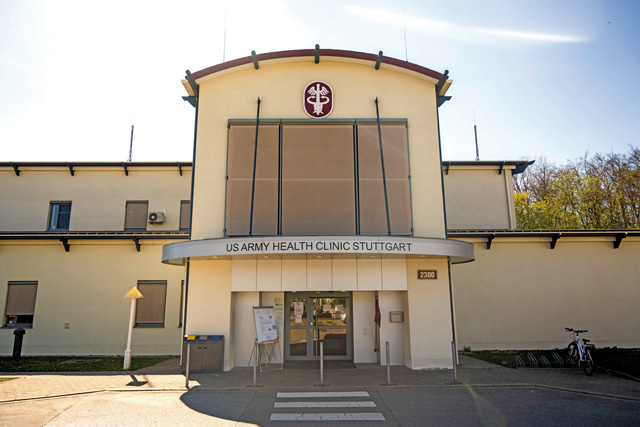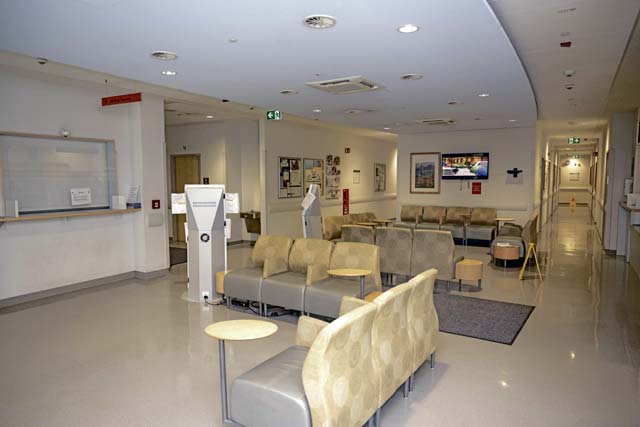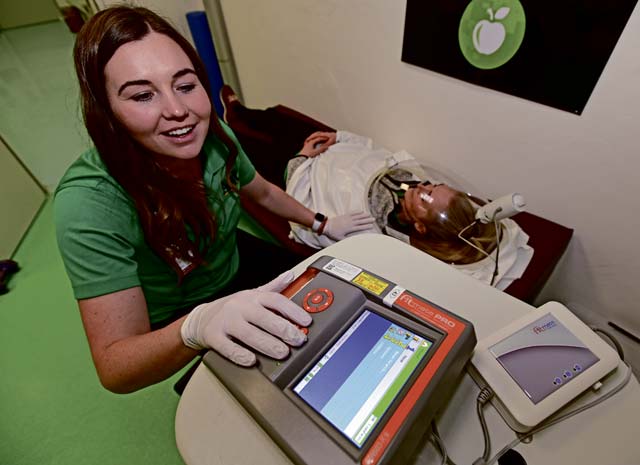
U.S. Army Health Clinic Stuttgart
The health system for service members, retirees, civilians and their families in Germany consists of local military community health services on Patch Barracks and Kelley Barracks, local host nation medical facilities for inpatient and outpatient primary and specialty care, and the Landstuhl Regional Medical Center (LRMC).
Upon arrival in Stuttgart, TRICARE beneficiaries must complete local enrollment during the healthcare in-processing brief at the Central Processing Facility. If not able to attend the brief, enrollment can also be completed at the TRICARE Service Center located at the Patch Health Clinic. Civilians are also strongly encour- aged to register at the clinic at the Medical Records section. Service members need to in-process through: (1) Medical Readiness to ensure all immunizations, periodic health examinations, etc., are up to date; and (2) Medical Records.
The Stuttgart military community is served by the Stuttgart Army Health Clinic on Patch Barracks, the Kelley Barracks clinic annex and the Stuttgart Dental Clinic on Panzer Kaserne.

The health clinic provides health care using the patient-centered medical home model which is a team-based health care delivery model, led by a physician, physician’s assistant, or nurse practitioner, that provides comprehensive and continuous medical care to patients. The services offered at the health clinic include: primary care, pediatrics, behavioral health, optometry, physical therapy, wellness center, telehealth, and public health.
Beneficiaries can make an appointment by calling CIV 06371-9464-2900 or DSN (314) 590-2900.
The Stuttgart Army Health Clinic does not provide emergency services; it relies on local German hospi- tals to provide emergency care. For this reason, in case
of an emergency, do not go to the Stuttgart clinic. Dial 112 from a civilian phone to reach the German
emergency services. From on-base DSN phones, dial 110 for the Military Police desk. The MPs can then contact additional emergency services as needed.
Care at the Patch and Kelley Clinic is provided based on enrollment status. Service Members and their command-sponsored families have priority access to the clinic. All Retirees not already enrolled with the clinic along with civilians, contractors and their families should check-in with the health clinic to determine if space is available for them to receive care.
The Kelley Clinic Annex offers adult primary care (primary care appointment only).
Dental Clinic
The dental clinic’s primary mission is to provide dental treatment to service members on active-duty orders for 30 days or more. All other personnel should establish dental care within the community by utilizing the TRICARE Dental Plan.
They provide general dentistry and hygiene appointments as well as specialty care for pediatric dentistry, prosthodontics and periodontics. Services in endodontics are currently limited. Services in orthodontics are available on a case-by-case basis, as well as being limited to active-duty personnel and children under 18. Some oral surgery support is available at the clinic, but complex surgery is referred to LRMC.
Dental insurance for family members is available through enrollment at https://www.uccitdp.com.
Host nation medical care
For some services, primary care providers may refer patients to host nation facilities, and the Stuttgart Army Health Clinic maintains relationships with an extensive network of English-speaking providers for specialty care on the German economy.
TRICARE Prime beneficiaries should contact their primary care team for routine off-post referrals then contact International S.O.S. (ISOS) to obtain authori- zation. Host nation treatment facilities may refuse to see Prime beneficiaries without ISOS authorization for routine care. They should also notify ISOS for all emergency care authorization and billing issues. ISOS can be reached by telephone at CIV 0800-5891599 (toll-free from Germany) or Europe-wide at 0044-20- 8762-8384 (international rates apply).
Beneficiaries should download the MyCare Overseas Mobile App to easily access ISOS services to include 24/7 assistance, healthcare finder, translation help, and referral/authorizations. More information on the MyCare Overseas Mobile App can be found at: https://tricare-overseas.com/beneficiaries/resources/beneficiary-app.
Those who are referred off-base should be aware that host nation medical clinics and hospitals have similar standards of care as those in the U.S., how- ever, we may have culture differences. For example, the general approach to how pain is addressed after a surgery can be quite different than the care you are accustomed to in the U.S.
Though many host nation doctors speak English, their staff may or may not. If you do not speak German, use a translation app or bilingual dictionary, or call Interpretation Services. The Language Line has more than 700 different
languages available (DSN 590- 8255 or +1 800 523 1786; the system will then ask for your Client ID: 574003).
Translation help can also be found on the MyCare Overseas Mobile App.
During rounds, junior physicians often accompany attending physicians. This can make it difficult for patients to feel comfortable asking questions. Write down your questions. During rounds is the appropriate time to ask if the doctor has time to address your questions, especially if you are requesting hospital discharge or pain management. If the doctor cannot
answer at that time, ask when the doctor can return. Host nation patient liaisons should be able to assist if you are having difficulties communicating. Some German physicians may not be in the habit of explaining details to patients. They will answer all questions when asked, but sometimes do not volunteer all results or information. Be sure to ask doctors about the treatment plan.
German privacy standards may differ from what many Americans are used to, so please keep in mind that we are in their country. Host nation physicians may not always use a chaperone when examining patients of the opposite sex. Ask for a chaperone if you feel uncomfortable

Landstuhl Regional Medical Center
LRMC is about a two-and-a-half-hour drive from the Stuttgart area. It offers a wide variety of specialty clinics and is a Level II Trauma Center verified by the American College of Surgeons. Major surgeries, specialty services and most other services not available at the Stuttgart clinics are available at LRMC. Visiting the specialty clinics at LRMC starts with a referral from Stuttgart’s primary care providers.
LRMC offers many high quality specialty care services for active duty service members and their families, as well as retirees, DoD civilians, contractors, DoDEA teachers and their family members. To see if specific specialty care services are available for your beneficiary category, reference the LRMC monthly availability report on the Specialty Care Services website at: https://landstuhl.tricare.mil/Getting-Care/Specialty-Care.
Telehealth and online services
The Telehealth Program directly connects geographically separated patients at U.S. Army Health Clinic Stuttgart with specialty care providers at LRMC via the use of video-teleconferencing. Patients can expect that advanced medical
devices such as otoscopes, stethoscopes and general exam cameras to be used if applicable. This service can alleviate the need to travel to LRMC while still receiving the same specialty care. You may initiate a Telehealth referral by either obtaining a referral from a clinic provider or by self-referral.
The Stuttgart health clinic uses the MHS GENESIS Patient Portal (https://my.mhsgenesis.health.mil) as a way for enrolled TRICARE beneficiaries to schedule or cancel appointments, request refills on medication, view lab results and to message their Primary Care Manager via Secure Messaging. Secure Messaging is a great way to contact their Primary Care Manager to ask non-urgent medical questions or receive information that does not require an in-person appointment. Beneficiaries can log in to the patient portal using their DS Logon, CAC, or DFAS MyPay account credentials.
All TRICARE beneficiaries are encouraged to download the ISOS MyCare App, which allows beneficiaries to find network providers, view their appointments and referrals to the network, and submit documents for medical translation. View more information on the MyCare App at https://www.tricare-overseas.com/beneficiaries/resources/beneficiary-app.
Like the Clinic on Facebook at https://www.facebook.com/StuttgartHealthClinic/
